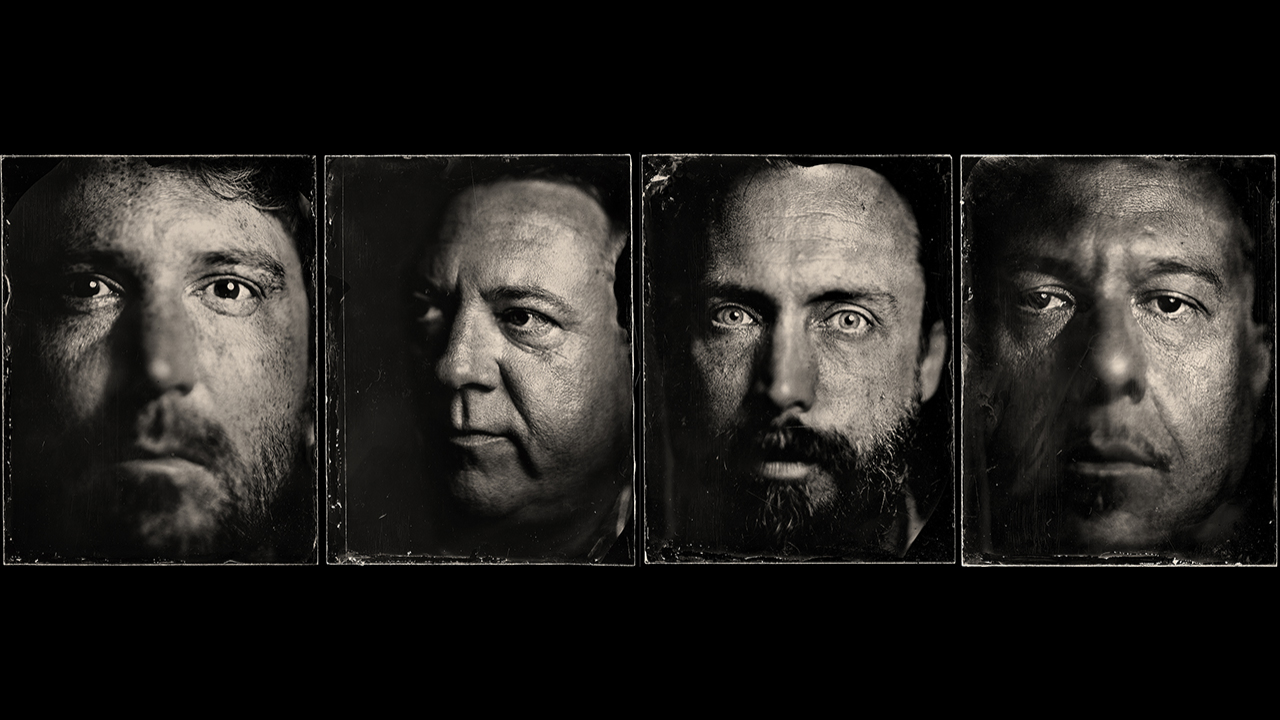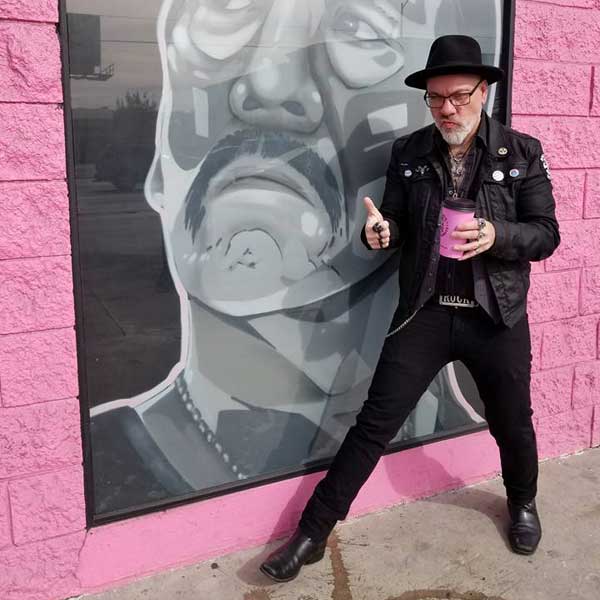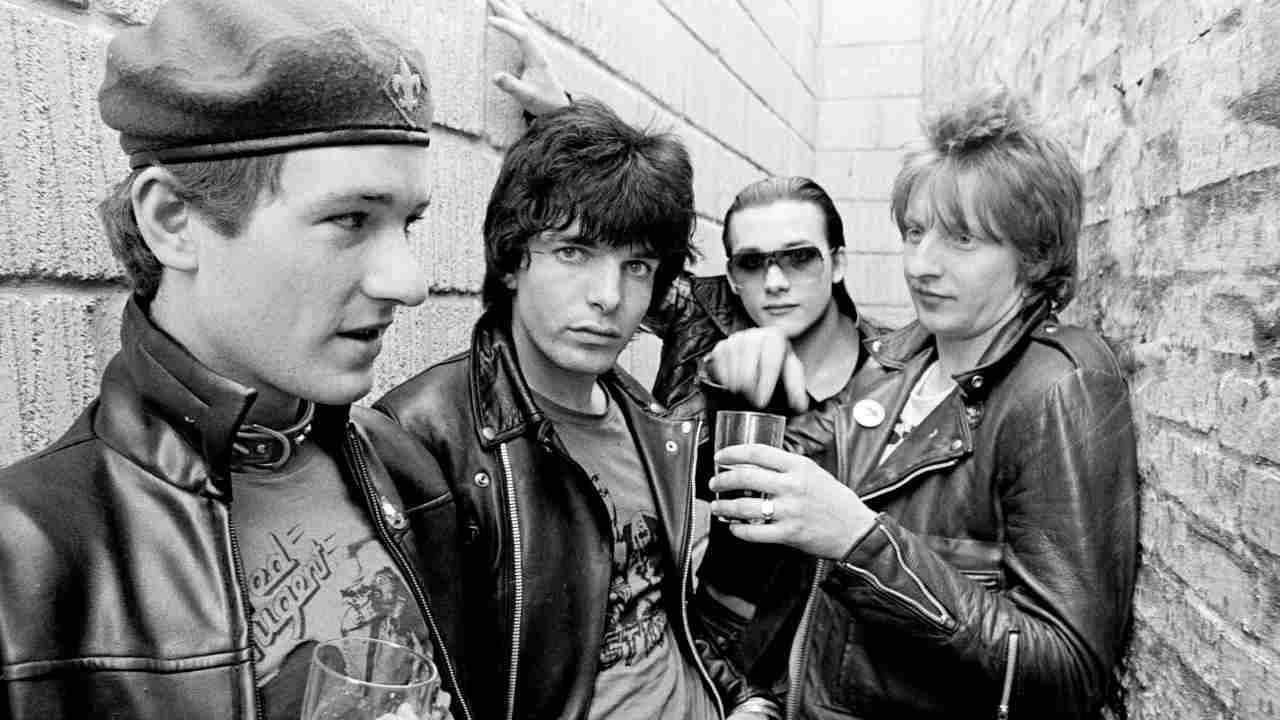Clutch: Rock'n'roll outlaws
No clichés. No fashion statements. No hits. So when the music industry imploded around their ears, it didn’t matter a jot. If anything, it only made Clutch more successful than ever…

Think back to the major-label feeding frenzy of the early 90s, when every band was going to be the “next Nirvana” but none of them ever were. How many of those bands are still together?
It’s easy to be Pearl Jam, man. They’re rich. It’s harder to be Mudhoney. And it’s even harder to be Clutch. Clutch never appealed to the cool kids. Clutch were never hip. Every time they landed at a new label it was the same routine: stop dressing like plumbers and write a hit song. They never did either.
Instead they endured, hammering together a red-hot, propulsive, stoner-funk attack so tight and loud and lethal that their riffs have actual weight and can strike a faithless man down – I’ve seen it with my own eyes. They’ve endured and they’ve thrived, building a nationwide – verging on global – working-class fan-base so rabid it borders on religious fervour, every trucker-hatted ham-and-egger in town hanging on the schizophrenic rantings of frontbeard Neil Fallon like it was some dirty, gutbucket gospel.
What other still-intact grunge-era band could unleash their most devastating album so late in the game like Clutch did with 2013’s mammoth Earth Rocker? And could they follow it up with an even bigger, meaner collection of crazed boiler-room jams like Clutch have with their new Psychic Warfare album? The answer, of course, is no. Nobody could. Except these cats.
Clutch are probably not the rock’n’roll heroes you want – I mean, they don’t wear leather jackets or shiny boots, they don’t bang fashion models or crash motorcycles or eat mountains of pills or anything cool like that – but they are definitely the rock’n’roll heroes you need. All hail Clutch, the last gang in town, pro-rockers in a sea of amateurs and dabblers. Eat their fuckin’ dust.
We find Clutch during a rare break in the action, a moment of respite before the new album hatches and the road swallows them up again. Singer Neil Fallon tends to his five-year-old son and his tomato garden; drummer Jean-Paul Gaster practises his drums. Both are happy to be where they’re at, on the heels of a successful album, living off their music, and not a shredded record label contract in sight.
“We got dropped by every major label that picked us up,” says Fallon, looking back on the band’s early days. “Some of them dropped us like a bad habit. But, I mean, we were never in the business of selling platinum records. We were never anywhere near that. What all these labels were after was the next Nirvana. So they would sign ninety-nine bands hoping that band number one hundred would pay all the bills for the previous ninety-nine. Clutch, we were always one of the ninety-nine.”
Sign up below to get the latest from Classic Rock, plus exclusive special offers, direct to your inbox!
“The struggles we had with the major labels – and the not-so-major labels as well – it was such a pain in the ass for us,” adds Gaster. “It was the same story told over and over again. Somebody from a major label would go out and see the band play, and they would see we had fans. I mean, in places like Detroit or in the Midwest we had pretty rabid fans almost immediately. So they’d think: ‘If this band just had more support, they could have a gold record.’ So that started the whole thing. We would sign with a label and they’d put us in the studio. To varying degrees they’d ask us to write a radio hit, and to varying degrees we’d try to do the best we can. But at the end of the day it just sounded like Clutch. So try as we might to play ball it just never happened.
“Inevitably the label would lose interest in the band because we didn’t sell as well as they expected us to, and we’d start the whole thing all over again with a different label. Luckily, by the time the music industry started to collapse in the late nineties we had developed a pretty solid fanbase. We were still standing when a lot of other bands crumbled.”
“I think for a lot of bands that was a bitter pill to swallow – to have a tour bus and all kinds of tour support, and then it’s gone,” says Fallon. “If you’ve been living like that for five or ten years, you’ve got to ask yourself: ‘Am I willing to get back in a van and start all over?’ A lot of musicians – and I understand why – said no. Because you’ve gotta ask yourself if this is all gonna happen again in ten years. But we didn’t. We’re kinda knuckle-headed like that. We just got back in the van.”
One of the reasons Clutch have survived over the years is because of their stubbornly loyal fan-base, a decidedly blue-collar cluster of hard-working, hard-partying weekend warriors who love this band with an enviable ferocity. “Yeah, our shows are not comprised of fifteen-year-old girls,” Fallon says, laughing. “These are people who work all week, and by God they’re gonna have a good time on the weekend. I remember seeing them come to shows when they were very young, and now they’re bringing their grown kids. That’s a pretty awesome thing to see.”
The appeal – beyond their hard-core rock’n’roll, of course – is Clutch’s authenticity. Whatever they’re doing, they’re not faking it.
“We never really thought about what kind of band we wanted to be,” says Fallon. “We were always too lazy to construct or live up to an image, so we just rolled up on stage wearing whatever we were wearing that day. Some people would be disappointed in that, like: ‘Oh, you’re not supposed to be so fat, man. Why don’t you have a nice shirt on?’ I mean, some people expect that. We’re not the band for them. But other people look at us and think: ‘I could hang out with these people.’ That makes the show easier to do. Then we can just concentrate on the music and having a good time. We would definitely disillusion a lot of our fans if we tucked our shirts in.”
Well, the great unwashed should rejoice, because the new album, Psychic Warfare, is a monster. Earth Rocker turned everything up to 10. This one goes to 11 – at least. Previously, Clutch railed against making sequel albums, preferring to start from scratch, sculpting records that sounded remarkably different from their predecessors. Not this time, however. If you liked the last one, you’ll love this one.
“I hear that myself. I think everyone in the band hears that,” says Fallon. “We didn’t want to make Earth Rocker II. But the thing is, we started writing this on the road soon after Earth Rocker, and we were kind of in a similar head-space. Maybe the philosophy of always trying to do something different, maybe we’re not obligated to do that any more. I know I was thinking at the beginning of this record: ‘How do we follow up Earth Rocker?’ Because it was so successful, you know? But then I realised we didn’t think about making a successful record when we wrote* Earth Rocker*, so why would we do it now?”
Indeed. Nothing succeeds like excess, after all, and this record has it in spades. So that’s the plan, basically. Psychic Warfare is gonna come down heavy, just like *Earth Rocker *did. The Clutch faithful will guzzle it down with big thirsty slugs and it will make them whole again. And with any luck, a few stray kids might be on the lookout for the real thing and discover the one band that won’t lie to them. Unless you count the crazy bullshit about swan-diving off the tongues of crippled giants that Fallon is always spouting off about. Seriously, let’s give it up for one of the most berserk operating today; a man who writes love songs from a werewolf’s point of view and envisions Dalek goon squads, plague doctors and subhumans locked in bloody battle. Basically, every Clutch song is the maddest story ever told.
“Most of my songs are based on fiction,” Fallon says. “Any politician can lie to thousands of people, but if they say it with conviction it’s no longer a lie. People believe it. Lyrics for me are much the same way, only with the caveat that I’m always admitting that it’s fiction. Some of my favourite lyricists are Tom Waits and Leonard Cohen. They don’t have the most beautiful singing voices in the world, but they know about the delivery.”
It’s all a lie. But just listen to the way he bellows out his lines. It’s a lie, but it’s all true too. That’s how pro rock works: the words are everything and nothing all at once. It’s all rock’n’roll alchemy. And a little science too. Let either of them go, and Fallon and Gaster will dig deep into how Clutch songs are constructed, pieced together from a riff, a drum beat or a lyric fragment. They’ll tell you how they take a new song and turn it into a Clutch classic by sweat and muscle and intense rehearsals where they’ll play the whole new album through – twice. When it comes to rock, Clutch wanna get their hands dirty, dig in deep, feel the blood pulsing under the skin. But this is not the world we live in any more.
“We’ve always been about the live show – always,” says Gaster. “That’s why we’re still around. A lot of young bands rely on social media to get their word out, but I’m not sure that works. And the actual economy of the nightclub circuit that we came up on, it’s kind of extinct at this point. When the whole downloading/streaming thing started, people would often ask: ‘What will this mean for the music?’ And I always said it would put more emphasis on the live show. And in our case I think it has. But that hasn’t translated to the baby bands out there. I keep expecting new scenes to bubble up from these small towns, but it’s just not happening.”
“These days, style is becoming more important than content,” adds Fallon. “People are more visually oriented than ever. And in the digital age it’s very easy to paint yourself into a corner in the studio. You’ve got unlimited tracks, and pitch-correct. And I’ve seen loads of bands get up on stage and I realise either they can’t pull it off, or half the shit that’s coming out of the PA is pre-recorded. Maybe I’m sounding like an old man, but I think a lot of that is lost on the kids. And even if they do know, they don’t give a shit.
“Here’s a perfect example. Two years ago we were playing South By Southwest. We played a club and the turnout was okay. We had a great show, I’m not dogging it. But there were other rock bands playing down the street and you could see the lines were kinda small. Across the street from us, though, there was a line of kids to get into this show that had to be a mile and a half long. They stood out there all day in the blazing sun to go see some dude with a laptop. And that was it. There were probably ten thousand kids in this tent, dancing and losing their minds to a guy who was basically hitting the fucking spacebar on his computer. To me, I mean, sure, you made this music that’s great and interesting, but this is not a live performance by any stretch.”
It’s not. You want it live? See Clutch. But are Clutch worried that they’re losing the rock wars to computer nerds and iPhones?
“No,” says Fallon. “I always keep in mind that even vinyl records are a relatively new technology and radio is a new technology, and we tend to have short memories about all this, whereas live music has been going on for hundreds of thousands of years. I consider it a human sacrament. You participate in live music for somebody, you transcend space and time. I refuse to believe that it will ever become obsolete.”
And neither, with any luck, will Clutch.
“I mean, one of us could die, obviously – that would do it,” says Gaster, pondering the only foreseeable end for his band. “I don’t really see any other reason we’d stop.”
“If I don’t do something creative I will become a very miserable man,” adds Fallon. “So it’s my intention to do this until I can’t do it any more. If that eventually means just doing a handful of shows every year, then that’s what it means. But the idea of ever hanging it up is just too dark of a notion for me at this point.”
And with that they’re gone. Perhaps to the tomato garden for now, but certainly not for long. Psychic Warfare is coming down fast, and Clutch’s smoke-belching caravan will soon barrel into your town. I humbly suggest you check them out. Put down the goddamn laptop and live a little.
Classic Rock contributor since 2003. Twenty Five years in music industry (40 if you count teenage xerox fanzines). Bylines for Metal Hammer, Decibel. AOR, Hitlist, Carbon 14, The Noise, Boston Phoenix, and spurious publications of increasing obscurity. Award-winning television producer, radio host, and podcaster. Voted “Best Rock Critic” in Boston twice. Last time was 2002, but still. Has been in over four music videos. True story.

